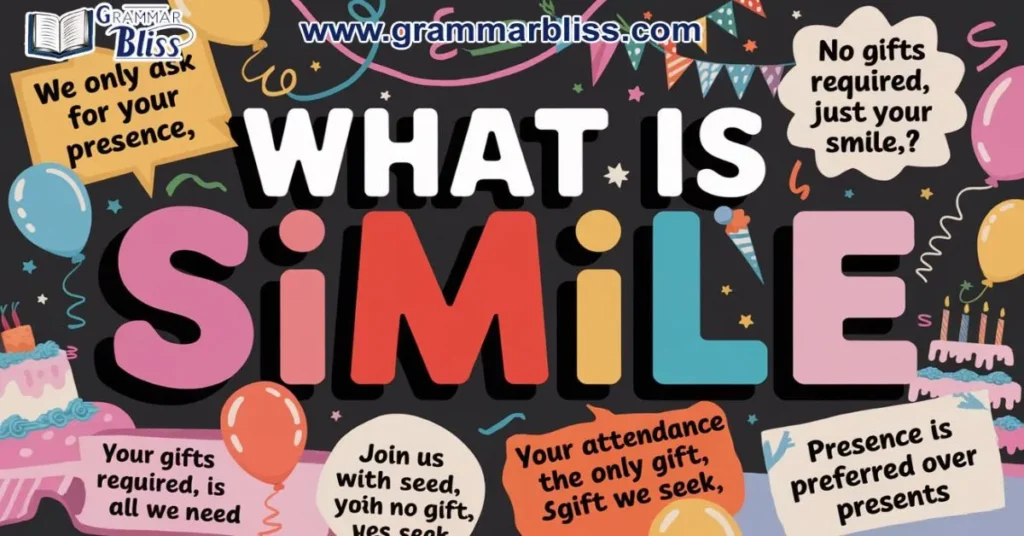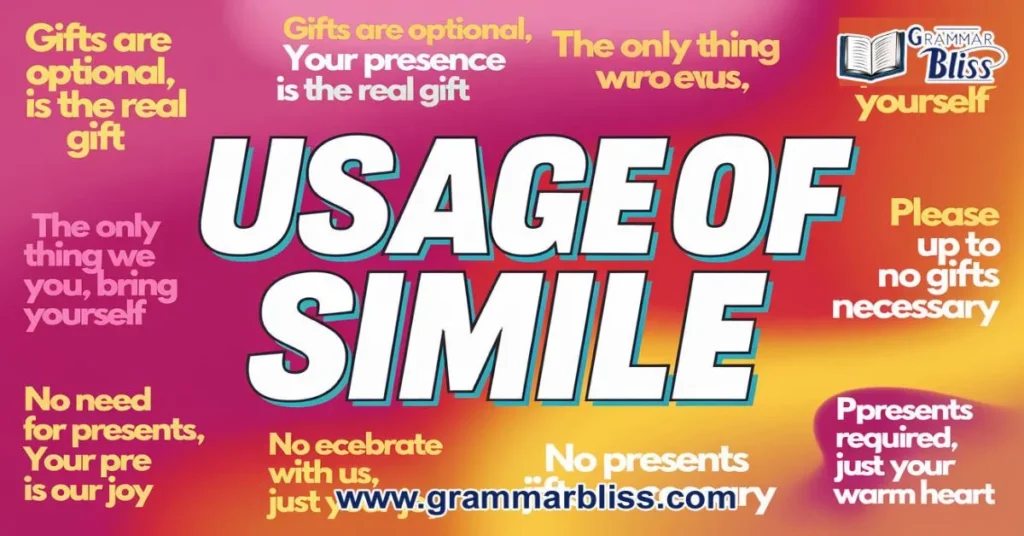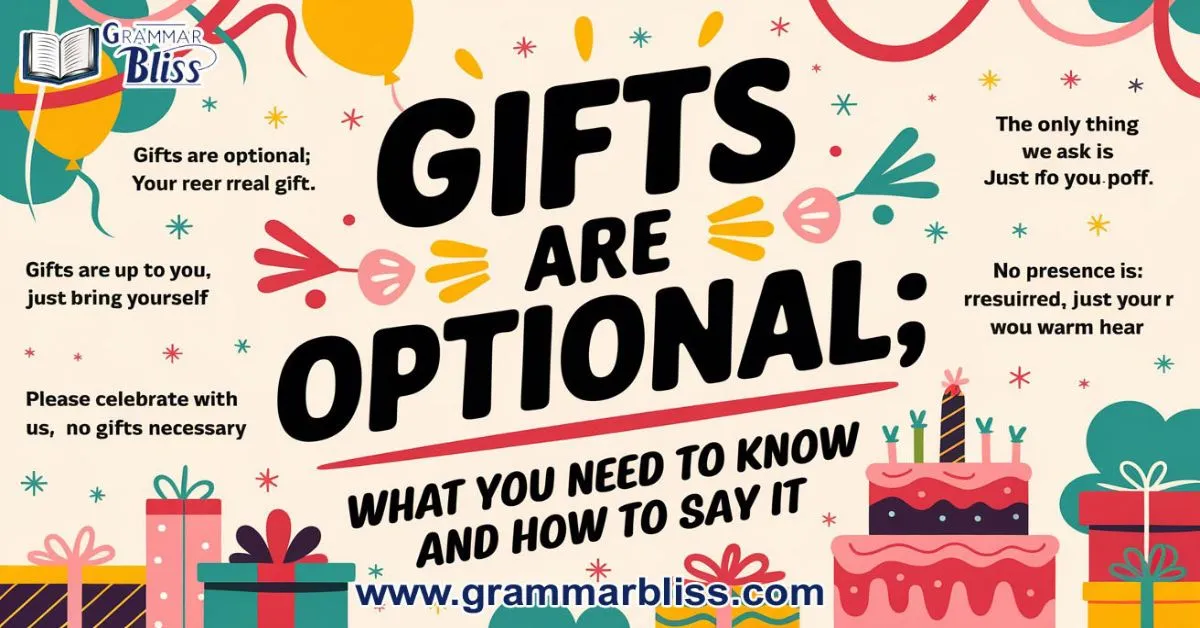When planning an event, many hosts struggle with how to politely express that gifts are optional. Whether you’re hosting a casual get-together or a more formal ceremony, it’s important to set the right tone for your celebration.
By making it clear that the presence of your guests is what truly matters, you create a relaxed and welcoming atmosphere. Using the right polite phrasing helps guests feel comfortable without the pressure of material gifts.
Here, we’ll explore a variety of ways to say “gifts are optional,” ensuring your invitations are warm and gracious, while emphasizing the value of shared experiences over presents.
Quick Summary
When planning any celebration, one of the key things to remember is that presence over presents is a common, yet thoughtful way of expressing how much you value your guests. If you want to send a clear message that gift-giving is optional, it’s essential to choose your words carefully. Clear communication about gifts ensures that your guests feel relaxed and comfortable at your event, with no obligation to bring a material gift. In the next sections, we’ll explain the best ways to convey this message and the reasons why this can benefit both you and your guests.
Read: cubical-vs-cubicle-a-quick-guide-to-their-distinctions/
What is Simile?

A simile is a comparison between two things using the words “like” or “as”. It helps create a vivid image in the reader’s mind and adds flavor to your writing. For example, saying “Her smile was like sunshine” paints a brighter and more inviting picture than simply saying, “Her smile was warm.” In the context of a celebration or an invitation, a simile can help make the message more personal and heartfelt. Instead of simply saying, “Gifts are optional,” you could say, “Your presence is like the perfect present.” This makes your message more creative, engaging, and memorable.
Usage of Simile

Incorporating similes into your invitations adds warmth and personality. A simple line like “Your presence is the greatest gift we could ask for” uses a comparison to emphasize how much your guests mean to you. By using similes, you create an inviting and gracious atmosphere where guests feel that their shared experiences are far more important than material things. When crafting your invitation, feel free to get creative and use phrases such as “Your company is more valuable than presents” or “Your presence means more than any gift could.” These thoughtful phrases help communicate both appreciation and warmth.
Ways to Say “Gifts Are Optional” on an Invitation
Let’s explore the various ways you can let your guests know that gifts are optional without feeling uncomfortable. The key is using polite phrasing that emphasizes appreciation for your guests’ presence. Here are some heartfelt ways to say it:
- We only ask for your presence, not presents
Meaning: Emphasizing that the guest’s company is the main thing you want.
Example: “Please join us to celebrate! We only ask for your presence, not presents.” - No gifts required, just your delightful presence
Meaning: Make it clear that gifts are not expected, only their presence.
Example: “We’re so excited to celebrate! No gifts required, just your delightful presence.” - Your company is all we need
Meaning: Expressing that the guest’s time is more valuable than material items.
Example: “We can’t wait to see you! Your company is all we need.” - No obligation for gifts, your presence is enough
Meaning: Guests are free from the pressure of buying gifts.
Example: “We’re looking forward to your company! No obligation for gifts, your presence is enough.” - Join us with no gifts, just your smile
Meaning: A lighthearted way to say the gift doesn’t matter, but their joy does.
Example: “We’d love for you to join us! Join us with no gifts, just your smile.” - Your attendance is the only gift we seek
Meaning: Highlighting that the real gift is the guest’s presence.
Example: “Your attendance is the only gift we seek at our special day.” - Presence is preferred over presents
Meaning: Reaffirming the value of being together over giving gifts.
Example: “We can’t wait to celebrate with you! Presence is preferred over presents.” - Gifts are optional; your presence is the real gift
Meaning: Explicitly stating that the gift isn’t required, but their presence is special.
Example: “Gifts are optional; your presence is the real gift we cherish.”
Learn: steam-or-steem-whats-the-difference/
- The only thing we ask is your company
Meaning: Emphasizing that guests are the main focus.
Example: “Come celebrate with us! The only thing we ask is your company.” - Gifts are up to you, just bring yourself
Meaning: Making it clear that gift-giving is entirely optional.
Example: “We’d love to have you with us! Gifts are up to you, just bring yourself.” - No need for presents, your presence is our joy
Meaning: Highlighting that joy comes from being together.
Example: “No need for presents, your presence is our joy at this celebration.” - Please celebrate with us, no gifts necessary
Meaning: A polite way to say there’s no expectation for gifts.
Example: “Please celebrate with us! No gifts necessary.” - No presents required, just your warm heart
Meaning: Emphasizing the emotional value of their presence over physical gifts.
Example: “We’re excited for your company—no presents required, just your warm heart.” - Gifts are not mandatory; we just want you there
Meaning: Guests’ presence is more important than any material gift.
Example: “Gifts are not mandatory; we just want you there to celebrate.” - Your presence is more than enough
Meaning: Reassuring guests that their attendance is all that’s needed.
Example: “We look forward to seeing you! Your presence is more than enough.” - Celebrate with us, gift-free and full of fun
Meaning: Encouraging guests to join in the celebration without worrying about gifts.
Example: “Celebrate with us, gift-free and full of fun!” - We would love to have you, no gifts expected
Meaning: A clear and welcoming way to say gifts aren’t necessary.
Example: “We would love to have you! No gifts expected.” - Gifts are optional—your company is the best gift
Meaning: Expressing that their company is the real gift.
Example: “Gifts are optional—your company is the best gift we could ask for.”
Explore: synonyms-of-family-emergency-meaning-and-alternatives/
- Presence over presents
Meaning: A short, catchy way to say that being there is more important than giving gifts.
Example: “We can’t wait to see you! Presence over presents every time.” - Celebrate with us—no pressure for gifts
Meaning: Relieving guests of any concerns about bringing gifts.
Example: “Come celebrate with us—no pressure for gifts, just bring your joy!” - Come as you are—gifts are optional
Meaning: Encouraging guests to attend without feeling the need for gifts.
Example: “Come as you are—gifts are optional, just bring your smile.” - We cherish your presence, no gifts necessary
Meaning: Expressing that what matters is their company, not a gift.
Example: “We cherish your presence more than anything, no gifts necessary.” - A gift-free celebration awaits you
Meaning: Letting guests know it’s okay to come without gifts.
Example: “Join us for a fun time—a gift-free celebration awaits you.” - No gifts required—just bring your best self
Meaning: Asking guests to show up with their best attitude, not gifts.
Example: “No gifts required—just bring your best self and enjoy the celebration.” - We’d love your presence, not presents
Meaning: A simple and direct way to express that gifts are not needed.
Example: “We’d love your presence, not presents, at our special day.” - Enjoy the celebration, gifts optional
Meaning: Allowing guests to focus on the fun without the need for gifts.
Example: “Enjoy the celebration—gifts optional, just come and have fun.” - Join us, gift-free and stress-free
Meaning: Making it clear that there is no need to bring anything.
Example: “Join us, gift-free and stress-free, to celebrate the occasion.” - Your presence means more than any gift
Meaning: Highlighting that their presence is the true gift.
Example: “Your presence means more than any gift—looking forward to celebrating with you!”
Grammar Rule and Example
Using the phrase “gifts are optional” is simple but requires careful construction for maximum clarity. Here’s a basic grammar rule to follow when you use this phrase:
- When you say “gifts are optional,” the word “optional” is an adjective that describes the noun “gifts.” In simpler terms, you’re telling your guests that bringing a gift is entirely up to them.
- Example: “Gifts are optional, but your presence is what truly matters.”
This clear and concise sentence effectively avoids any confusion, ensuring that your guests fully understand the event etiquette. Specifically, the key to this phrasing lies in separating the gift-giving aspect from the true purpose of the celebration, which is, after all, to have your guests by your side.
FAQ’s
What does “gifts are optional” mean on an invitation?
It means guests are not required to bring gifts, and their presence is the main focus.
How can I politely tell guests no gifts are needed?
Use phrases like “Your presence is the greatest gift” or “Gifts are optional, just bring yourself!”
Is it okay to say “no gifts required” on a formal invitation?
Yes, as long as the tone is warm and appreciative, it’s perfectly acceptable for both casual and formal events.
Why is it important to say “gifts are optional”?
It reduces pressure on guests, ensuring they feel comfortable and valued for their presence.
Can I use these phrases for any type of celebration?
Yes, these thoughtful phrases work for weddings, birthdays, and any other event, formal or casual.
Conclusion
Communicating that gifts are optional is a thoughtful way to create a welcoming and relaxed atmosphere for your celebration. By using polite phrasing and emphasizing that your guests’ presence is the greatest gift, you can set the right tone for your event. Whether it’s a casual gathering or a formal ceremony, the key is to express your gratitude without making anyone feel pressured. With the right words, your invitation will reflect the true spirit of the occasion—shared experiences and togetherness, without the need for material gifts.

